Exploring Music, Movement, and Drama in Early Childhood Education
VerifiedAdded on 2023/06/10
|10
|2607
|313
Essay
AI Summary
This essay explores the theoretical underpinnings and practical value of incorporating music, movement, and drama into early childhood education curricula. It critiques the theories of Kodaly and Orff, highlighting the importance of cultural context and active participation in music education. The essay emphasizes the role of movement and dance in satisfying children's mental, emotional, and physical needs, and it discusses the imaginative and empathetic development fostered by dramatic play. Advocating for the inclusion of these elements, the essay cites research supporting the positive impact of music on brain development and the benefits of movement and drama on self-regulation, language skills, and conflict resolution. It concludes that music, movement, and drama are essential for the holistic development of young children, enhancing their intellectual, emotional, and physical well-being, and preparing them for future learning.
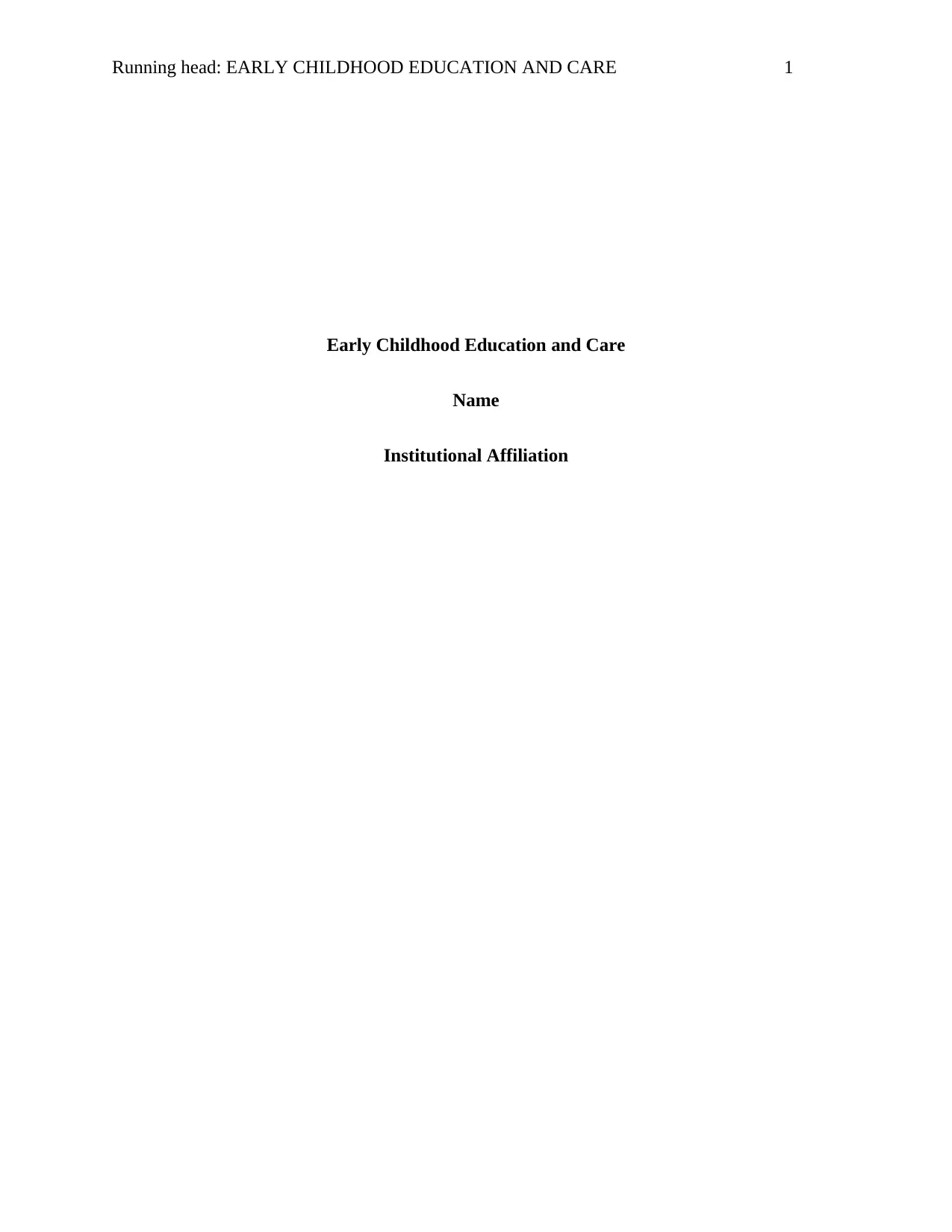
Running head: EARLY CHILDHOOD EDUCATION AND CARE 1
Early Childhood Education and Care
Name
Institutional Affiliation
Early Childhood Education and Care
Name
Institutional Affiliation
Paraphrase This Document
Need a fresh take? Get an instant paraphrase of this document with our AI Paraphraser
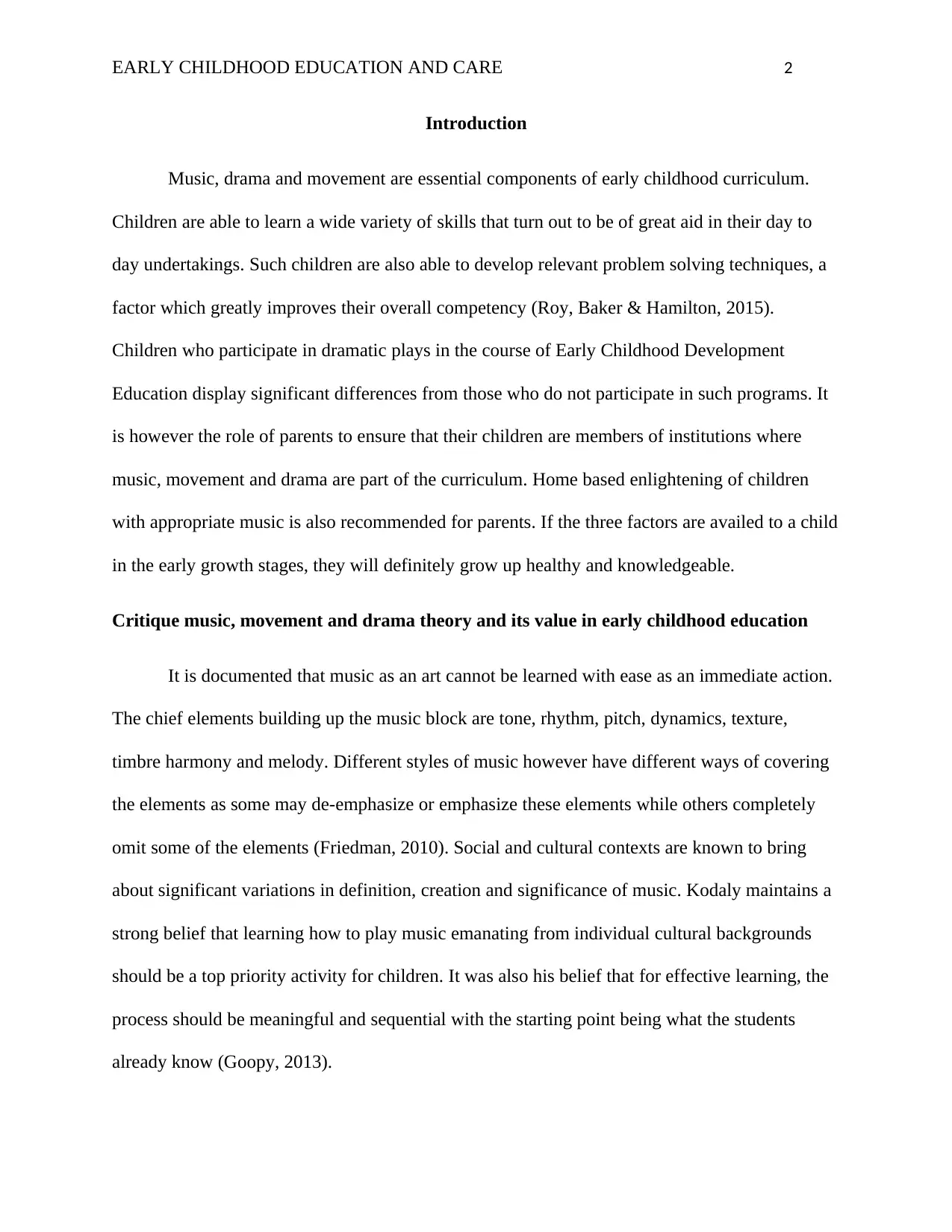
EARLY CHILDHOOD EDUCATION AND CARE 2
Introduction
Music, drama and movement are essential components of early childhood curriculum.
Children are able to learn a wide variety of skills that turn out to be of great aid in their day to
day undertakings. Such children are also able to develop relevant problem solving techniques, a
factor which greatly improves their overall competency (Roy, Baker & Hamilton, 2015).
Children who participate in dramatic plays in the course of Early Childhood Development
Education display significant differences from those who do not participate in such programs. It
is however the role of parents to ensure that their children are members of institutions where
music, movement and drama are part of the curriculum. Home based enlightening of children
with appropriate music is also recommended for parents. If the three factors are availed to a child
in the early growth stages, they will definitely grow up healthy and knowledgeable.
Critique music, movement and drama theory and its value in early childhood education
It is documented that music as an art cannot be learned with ease as an immediate action.
The chief elements building up the music block are tone, rhythm, pitch, dynamics, texture,
timbre harmony and melody. Different styles of music however have different ways of covering
the elements as some may de-emphasize or emphasize these elements while others completely
omit some of the elements (Friedman, 2010). Social and cultural contexts are known to bring
about significant variations in definition, creation and significance of music. Kodaly maintains a
strong belief that learning how to play music emanating from individual cultural backgrounds
should be a top priority activity for children. It was also his belief that for effective learning, the
process should be meaningful and sequential with the starting point being what the students
already know (Goopy, 2013).
Introduction
Music, drama and movement are essential components of early childhood curriculum.
Children are able to learn a wide variety of skills that turn out to be of great aid in their day to
day undertakings. Such children are also able to develop relevant problem solving techniques, a
factor which greatly improves their overall competency (Roy, Baker & Hamilton, 2015).
Children who participate in dramatic plays in the course of Early Childhood Development
Education display significant differences from those who do not participate in such programs. It
is however the role of parents to ensure that their children are members of institutions where
music, movement and drama are part of the curriculum. Home based enlightening of children
with appropriate music is also recommended for parents. If the three factors are availed to a child
in the early growth stages, they will definitely grow up healthy and knowledgeable.
Critique music, movement and drama theory and its value in early childhood education
It is documented that music as an art cannot be learned with ease as an immediate action.
The chief elements building up the music block are tone, rhythm, pitch, dynamics, texture,
timbre harmony and melody. Different styles of music however have different ways of covering
the elements as some may de-emphasize or emphasize these elements while others completely
omit some of the elements (Friedman, 2010). Social and cultural contexts are known to bring
about significant variations in definition, creation and significance of music. Kodaly maintains a
strong belief that learning how to play music emanating from individual cultural backgrounds
should be a top priority activity for children. It was also his belief that for effective learning, the
process should be meaningful and sequential with the starting point being what the students
already know (Goopy, 2013).
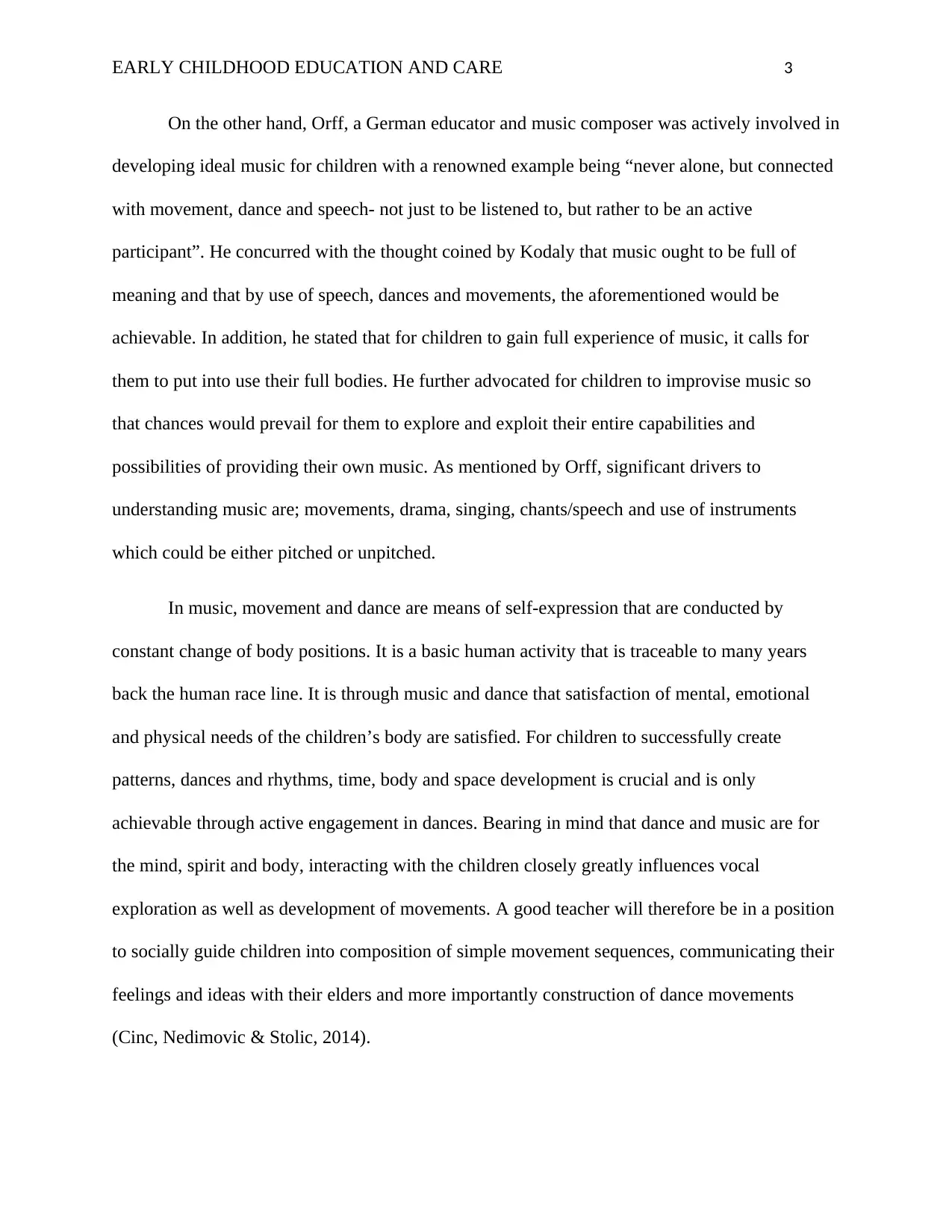
EARLY CHILDHOOD EDUCATION AND CARE 3
On the other hand, Orff, a German educator and music composer was actively involved in
developing ideal music for children with a renowned example being “never alone, but connected
with movement, dance and speech- not just to be listened to, but rather to be an active
participant”. He concurred with the thought coined by Kodaly that music ought to be full of
meaning and that by use of speech, dances and movements, the aforementioned would be
achievable. In addition, he stated that for children to gain full experience of music, it calls for
them to put into use their full bodies. He further advocated for children to improvise music so
that chances would prevail for them to explore and exploit their entire capabilities and
possibilities of providing their own music. As mentioned by Orff, significant drivers to
understanding music are; movements, drama, singing, chants/speech and use of instruments
which could be either pitched or unpitched.
In music, movement and dance are means of self-expression that are conducted by
constant change of body positions. It is a basic human activity that is traceable to many years
back the human race line. It is through music and dance that satisfaction of mental, emotional
and physical needs of the children’s body are satisfied. For children to successfully create
patterns, dances and rhythms, time, body and space development is crucial and is only
achievable through active engagement in dances. Bearing in mind that dance and music are for
the mind, spirit and body, interacting with the children closely greatly influences vocal
exploration as well as development of movements. A good teacher will therefore be in a position
to socially guide children into composition of simple movement sequences, communicating their
feelings and ideas with their elders and more importantly construction of dance movements
(Cinc, Nedimovic & Stolic, 2014).
On the other hand, Orff, a German educator and music composer was actively involved in
developing ideal music for children with a renowned example being “never alone, but connected
with movement, dance and speech- not just to be listened to, but rather to be an active
participant”. He concurred with the thought coined by Kodaly that music ought to be full of
meaning and that by use of speech, dances and movements, the aforementioned would be
achievable. In addition, he stated that for children to gain full experience of music, it calls for
them to put into use their full bodies. He further advocated for children to improvise music so
that chances would prevail for them to explore and exploit their entire capabilities and
possibilities of providing their own music. As mentioned by Orff, significant drivers to
understanding music are; movements, drama, singing, chants/speech and use of instruments
which could be either pitched or unpitched.
In music, movement and dance are means of self-expression that are conducted by
constant change of body positions. It is a basic human activity that is traceable to many years
back the human race line. It is through music and dance that satisfaction of mental, emotional
and physical needs of the children’s body are satisfied. For children to successfully create
patterns, dances and rhythms, time, body and space development is crucial and is only
achievable through active engagement in dances. Bearing in mind that dance and music are for
the mind, spirit and body, interacting with the children closely greatly influences vocal
exploration as well as development of movements. A good teacher will therefore be in a position
to socially guide children into composition of simple movement sequences, communicating their
feelings and ideas with their elders and more importantly construction of dance movements
(Cinc, Nedimovic & Stolic, 2014).
⊘ This is a preview!⊘
Do you want full access?
Subscribe today to unlock all pages.

Trusted by 1+ million students worldwide
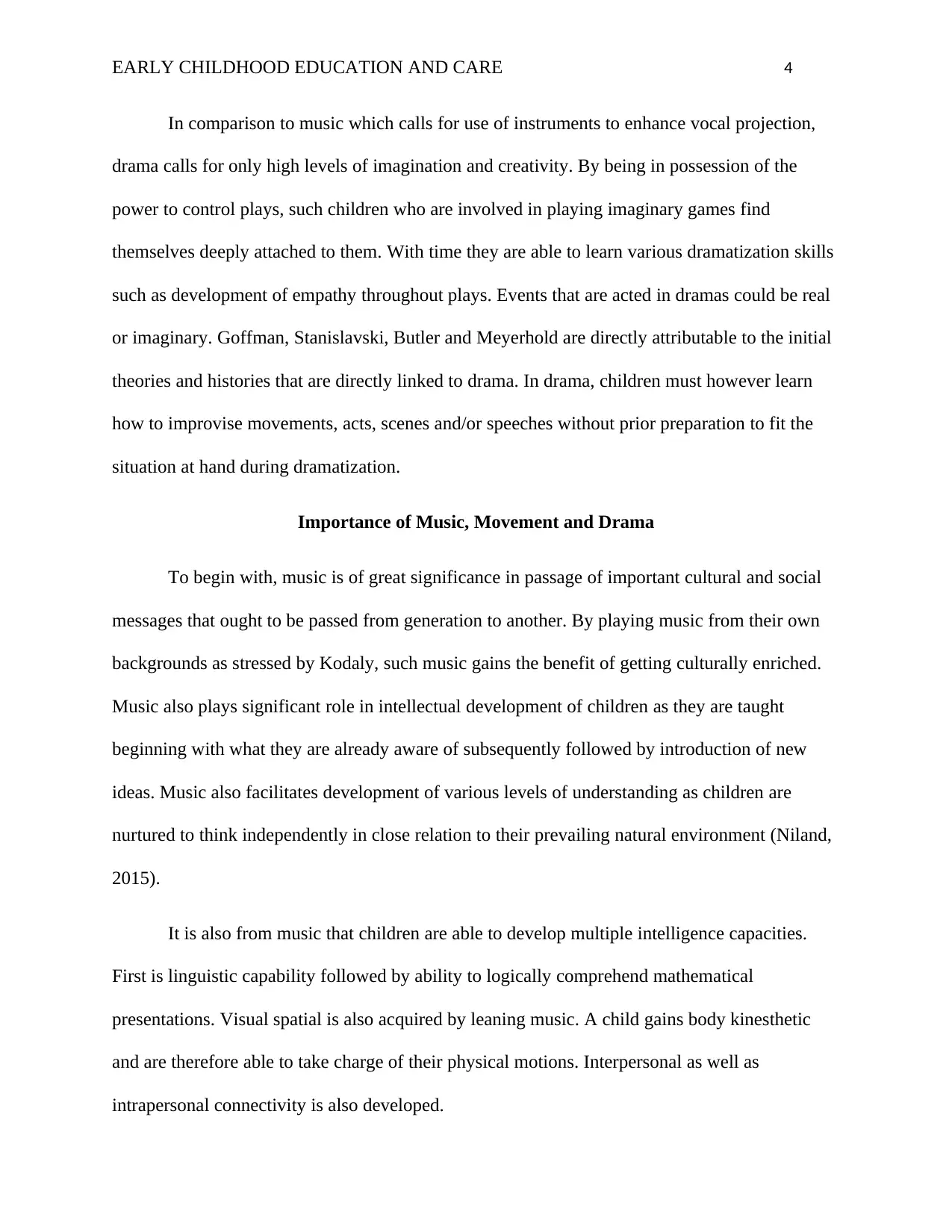
EARLY CHILDHOOD EDUCATION AND CARE 4
In comparison to music which calls for use of instruments to enhance vocal projection,
drama calls for only high levels of imagination and creativity. By being in possession of the
power to control plays, such children who are involved in playing imaginary games find
themselves deeply attached to them. With time they are able to learn various dramatization skills
such as development of empathy throughout plays. Events that are acted in dramas could be real
or imaginary. Goffman, Stanislavski, Butler and Meyerhold are directly attributable to the initial
theories and histories that are directly linked to drama. In drama, children must however learn
how to improvise movements, acts, scenes and/or speeches without prior preparation to fit the
situation at hand during dramatization.
Importance of Music, Movement and Drama
To begin with, music is of great significance in passage of important cultural and social
messages that ought to be passed from generation to another. By playing music from their own
backgrounds as stressed by Kodaly, such music gains the benefit of getting culturally enriched.
Music also plays significant role in intellectual development of children as they are taught
beginning with what they are already aware of subsequently followed by introduction of new
ideas. Music also facilitates development of various levels of understanding as children are
nurtured to think independently in close relation to their prevailing natural environment (Niland,
2015).
It is also from music that children are able to develop multiple intelligence capacities.
First is linguistic capability followed by ability to logically comprehend mathematical
presentations. Visual spatial is also acquired by leaning music. A child gains body kinesthetic
and are therefore able to take charge of their physical motions. Interpersonal as well as
intrapersonal connectivity is also developed.
In comparison to music which calls for use of instruments to enhance vocal projection,
drama calls for only high levels of imagination and creativity. By being in possession of the
power to control plays, such children who are involved in playing imaginary games find
themselves deeply attached to them. With time they are able to learn various dramatization skills
such as development of empathy throughout plays. Events that are acted in dramas could be real
or imaginary. Goffman, Stanislavski, Butler and Meyerhold are directly attributable to the initial
theories and histories that are directly linked to drama. In drama, children must however learn
how to improvise movements, acts, scenes and/or speeches without prior preparation to fit the
situation at hand during dramatization.
Importance of Music, Movement and Drama
To begin with, music is of great significance in passage of important cultural and social
messages that ought to be passed from generation to another. By playing music from their own
backgrounds as stressed by Kodaly, such music gains the benefit of getting culturally enriched.
Music also plays significant role in intellectual development of children as they are taught
beginning with what they are already aware of subsequently followed by introduction of new
ideas. Music also facilitates development of various levels of understanding as children are
nurtured to think independently in close relation to their prevailing natural environment (Niland,
2015).
It is also from music that children are able to develop multiple intelligence capacities.
First is linguistic capability followed by ability to logically comprehend mathematical
presentations. Visual spatial is also acquired by leaning music. A child gains body kinesthetic
and are therefore able to take charge of their physical motions. Interpersonal as well as
intrapersonal connectivity is also developed.
Paraphrase This Document
Need a fresh take? Get an instant paraphrase of this document with our AI Paraphraser
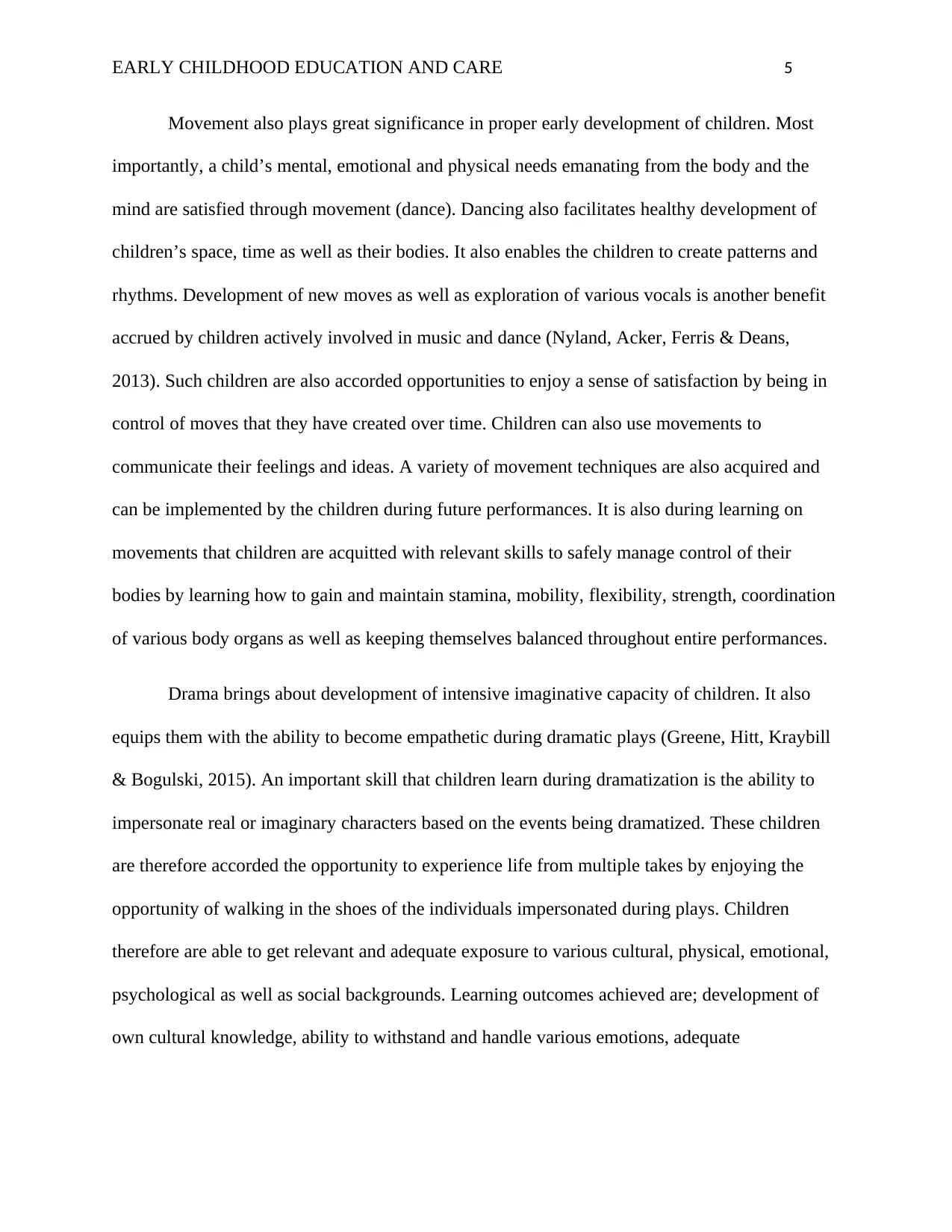
EARLY CHILDHOOD EDUCATION AND CARE 5
Movement also plays great significance in proper early development of children. Most
importantly, a child’s mental, emotional and physical needs emanating from the body and the
mind are satisfied through movement (dance). Dancing also facilitates healthy development of
children’s space, time as well as their bodies. It also enables the children to create patterns and
rhythms. Development of new moves as well as exploration of various vocals is another benefit
accrued by children actively involved in music and dance (Nyland, Acker, Ferris & Deans,
2013). Such children are also accorded opportunities to enjoy a sense of satisfaction by being in
control of moves that they have created over time. Children can also use movements to
communicate their feelings and ideas. A variety of movement techniques are also acquired and
can be implemented by the children during future performances. It is also during learning on
movements that children are acquitted with relevant skills to safely manage control of their
bodies by learning how to gain and maintain stamina, mobility, flexibility, strength, coordination
of various body organs as well as keeping themselves balanced throughout entire performances.
Drama brings about development of intensive imaginative capacity of children. It also
equips them with the ability to become empathetic during dramatic plays (Greene, Hitt, Kraybill
& Bogulski, 2015). An important skill that children learn during dramatization is the ability to
impersonate real or imaginary characters based on the events being dramatized. These children
are therefore accorded the opportunity to experience life from multiple takes by enjoying the
opportunity of walking in the shoes of the individuals impersonated during plays. Children
therefore are able to get relevant and adequate exposure to various cultural, physical, emotional,
psychological as well as social backgrounds. Learning outcomes achieved are; development of
own cultural knowledge, ability to withstand and handle various emotions, adequate
Movement also plays great significance in proper early development of children. Most
importantly, a child’s mental, emotional and physical needs emanating from the body and the
mind are satisfied through movement (dance). Dancing also facilitates healthy development of
children’s space, time as well as their bodies. It also enables the children to create patterns and
rhythms. Development of new moves as well as exploration of various vocals is another benefit
accrued by children actively involved in music and dance (Nyland, Acker, Ferris & Deans,
2013). Such children are also accorded opportunities to enjoy a sense of satisfaction by being in
control of moves that they have created over time. Children can also use movements to
communicate their feelings and ideas. A variety of movement techniques are also acquired and
can be implemented by the children during future performances. It is also during learning on
movements that children are acquitted with relevant skills to safely manage control of their
bodies by learning how to gain and maintain stamina, mobility, flexibility, strength, coordination
of various body organs as well as keeping themselves balanced throughout entire performances.
Drama brings about development of intensive imaginative capacity of children. It also
equips them with the ability to become empathetic during dramatic plays (Greene, Hitt, Kraybill
& Bogulski, 2015). An important skill that children learn during dramatization is the ability to
impersonate real or imaginary characters based on the events being dramatized. These children
are therefore accorded the opportunity to experience life from multiple takes by enjoying the
opportunity of walking in the shoes of the individuals impersonated during plays. Children
therefore are able to get relevant and adequate exposure to various cultural, physical, emotional,
psychological as well as social backgrounds. Learning outcomes achieved are; development of
own cultural knowledge, ability to withstand and handle various emotions, adequate
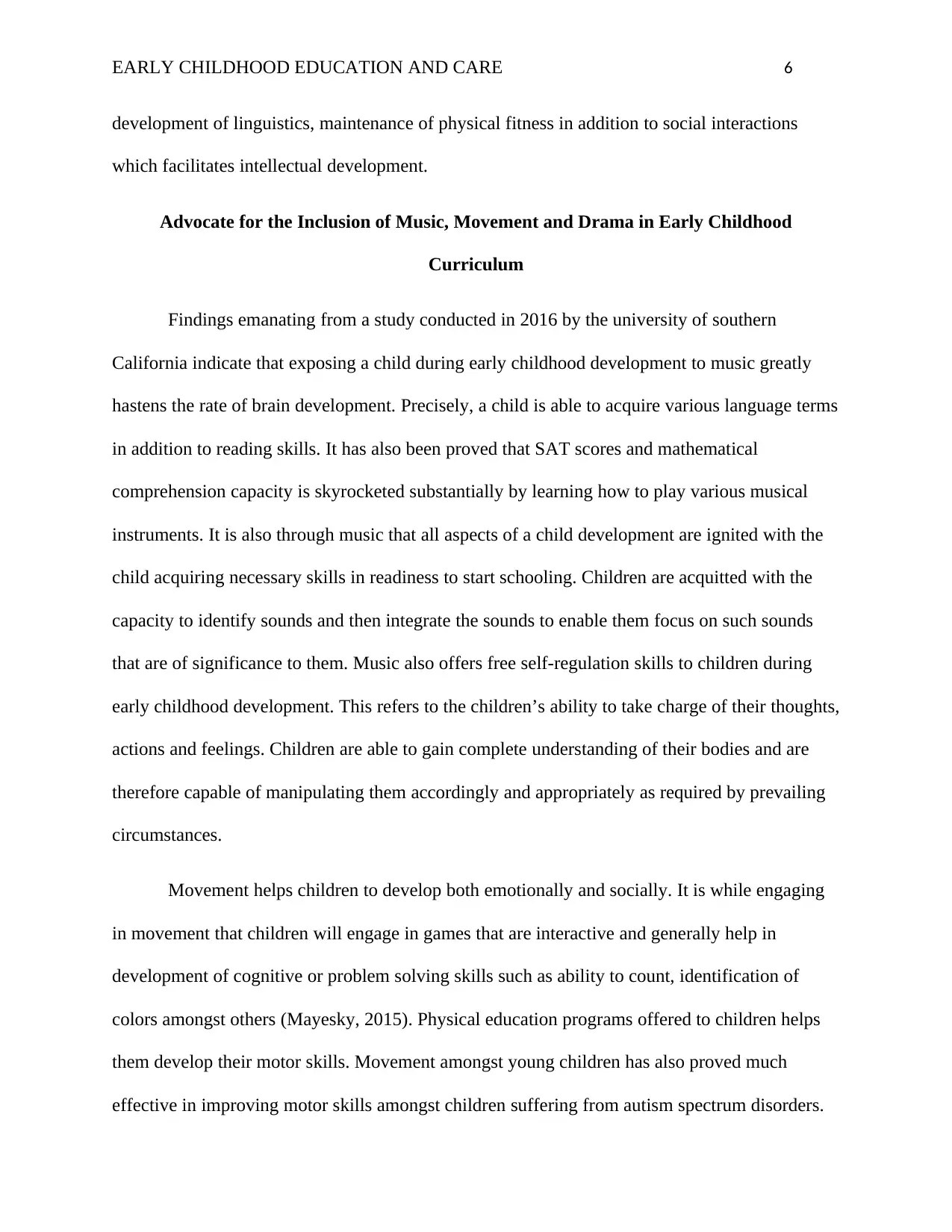
EARLY CHILDHOOD EDUCATION AND CARE 6
development of linguistics, maintenance of physical fitness in addition to social interactions
which facilitates intellectual development.
Advocate for the Inclusion of Music, Movement and Drama in Early Childhood
Curriculum
Findings emanating from a study conducted in 2016 by the university of southern
California indicate that exposing a child during early childhood development to music greatly
hastens the rate of brain development. Precisely, a child is able to acquire various language terms
in addition to reading skills. It has also been proved that SAT scores and mathematical
comprehension capacity is skyrocketed substantially by learning how to play various musical
instruments. It is also through music that all aspects of a child development are ignited with the
child acquiring necessary skills in readiness to start schooling. Children are acquitted with the
capacity to identify sounds and then integrate the sounds to enable them focus on such sounds
that are of significance to them. Music also offers free self-regulation skills to children during
early childhood development. This refers to the children’s ability to take charge of their thoughts,
actions and feelings. Children are able to gain complete understanding of their bodies and are
therefore capable of manipulating them accordingly and appropriately as required by prevailing
circumstances.
Movement helps children to develop both emotionally and socially. It is while engaging
in movement that children will engage in games that are interactive and generally help in
development of cognitive or problem solving skills such as ability to count, identification of
colors amongst others (Mayesky, 2015). Physical education programs offered to children helps
them develop their motor skills. Movement amongst young children has also proved much
effective in improving motor skills amongst children suffering from autism spectrum disorders.
development of linguistics, maintenance of physical fitness in addition to social interactions
which facilitates intellectual development.
Advocate for the Inclusion of Music, Movement and Drama in Early Childhood
Curriculum
Findings emanating from a study conducted in 2016 by the university of southern
California indicate that exposing a child during early childhood development to music greatly
hastens the rate of brain development. Precisely, a child is able to acquire various language terms
in addition to reading skills. It has also been proved that SAT scores and mathematical
comprehension capacity is skyrocketed substantially by learning how to play various musical
instruments. It is also through music that all aspects of a child development are ignited with the
child acquiring necessary skills in readiness to start schooling. Children are acquitted with the
capacity to identify sounds and then integrate the sounds to enable them focus on such sounds
that are of significance to them. Music also offers free self-regulation skills to children during
early childhood development. This refers to the children’s ability to take charge of their thoughts,
actions and feelings. Children are able to gain complete understanding of their bodies and are
therefore capable of manipulating them accordingly and appropriately as required by prevailing
circumstances.
Movement helps children to develop both emotionally and socially. It is while engaging
in movement that children will engage in games that are interactive and generally help in
development of cognitive or problem solving skills such as ability to count, identification of
colors amongst others (Mayesky, 2015). Physical education programs offered to children helps
them develop their motor skills. Movement amongst young children has also proved much
effective in improving motor skills amongst children suffering from autism spectrum disorders.
⊘ This is a preview!⊘
Do you want full access?
Subscribe today to unlock all pages.

Trusted by 1+ million students worldwide
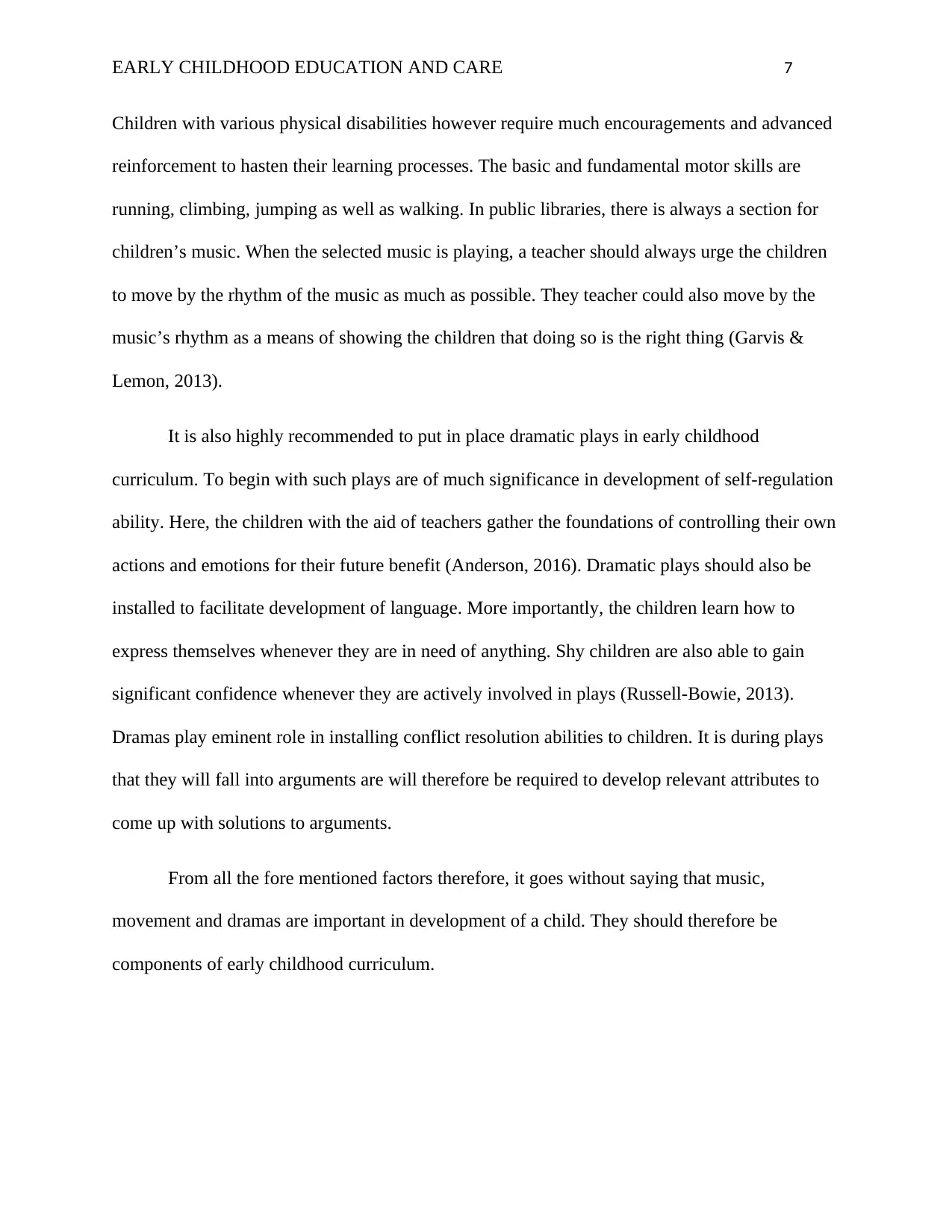
EARLY CHILDHOOD EDUCATION AND CARE 7
Children with various physical disabilities however require much encouragements and advanced
reinforcement to hasten their learning processes. The basic and fundamental motor skills are
running, climbing, jumping as well as walking. In public libraries, there is always a section for
children’s music. When the selected music is playing, a teacher should always urge the children
to move by the rhythm of the music as much as possible. They teacher could also move by the
music’s rhythm as a means of showing the children that doing so is the right thing (Garvis &
Lemon, 2013).
It is also highly recommended to put in place dramatic plays in early childhood
curriculum. To begin with such plays are of much significance in development of self-regulation
ability. Here, the children with the aid of teachers gather the foundations of controlling their own
actions and emotions for their future benefit (Anderson, 2016). Dramatic plays should also be
installed to facilitate development of language. More importantly, the children learn how to
express themselves whenever they are in need of anything. Shy children are also able to gain
significant confidence whenever they are actively involved in plays (Russell-Bowie, 2013).
Dramas play eminent role in installing conflict resolution abilities to children. It is during plays
that they will fall into arguments are will therefore be required to develop relevant attributes to
come up with solutions to arguments.
From all the fore mentioned factors therefore, it goes without saying that music,
movement and dramas are important in development of a child. They should therefore be
components of early childhood curriculum.
Children with various physical disabilities however require much encouragements and advanced
reinforcement to hasten their learning processes. The basic and fundamental motor skills are
running, climbing, jumping as well as walking. In public libraries, there is always a section for
children’s music. When the selected music is playing, a teacher should always urge the children
to move by the rhythm of the music as much as possible. They teacher could also move by the
music’s rhythm as a means of showing the children that doing so is the right thing (Garvis &
Lemon, 2013).
It is also highly recommended to put in place dramatic plays in early childhood
curriculum. To begin with such plays are of much significance in development of self-regulation
ability. Here, the children with the aid of teachers gather the foundations of controlling their own
actions and emotions for their future benefit (Anderson, 2016). Dramatic plays should also be
installed to facilitate development of language. More importantly, the children learn how to
express themselves whenever they are in need of anything. Shy children are also able to gain
significant confidence whenever they are actively involved in plays (Russell-Bowie, 2013).
Dramas play eminent role in installing conflict resolution abilities to children. It is during plays
that they will fall into arguments are will therefore be required to develop relevant attributes to
come up with solutions to arguments.
From all the fore mentioned factors therefore, it goes without saying that music,
movement and dramas are important in development of a child. They should therefore be
components of early childhood curriculum.
Paraphrase This Document
Need a fresh take? Get an instant paraphrase of this document with our AI Paraphraser
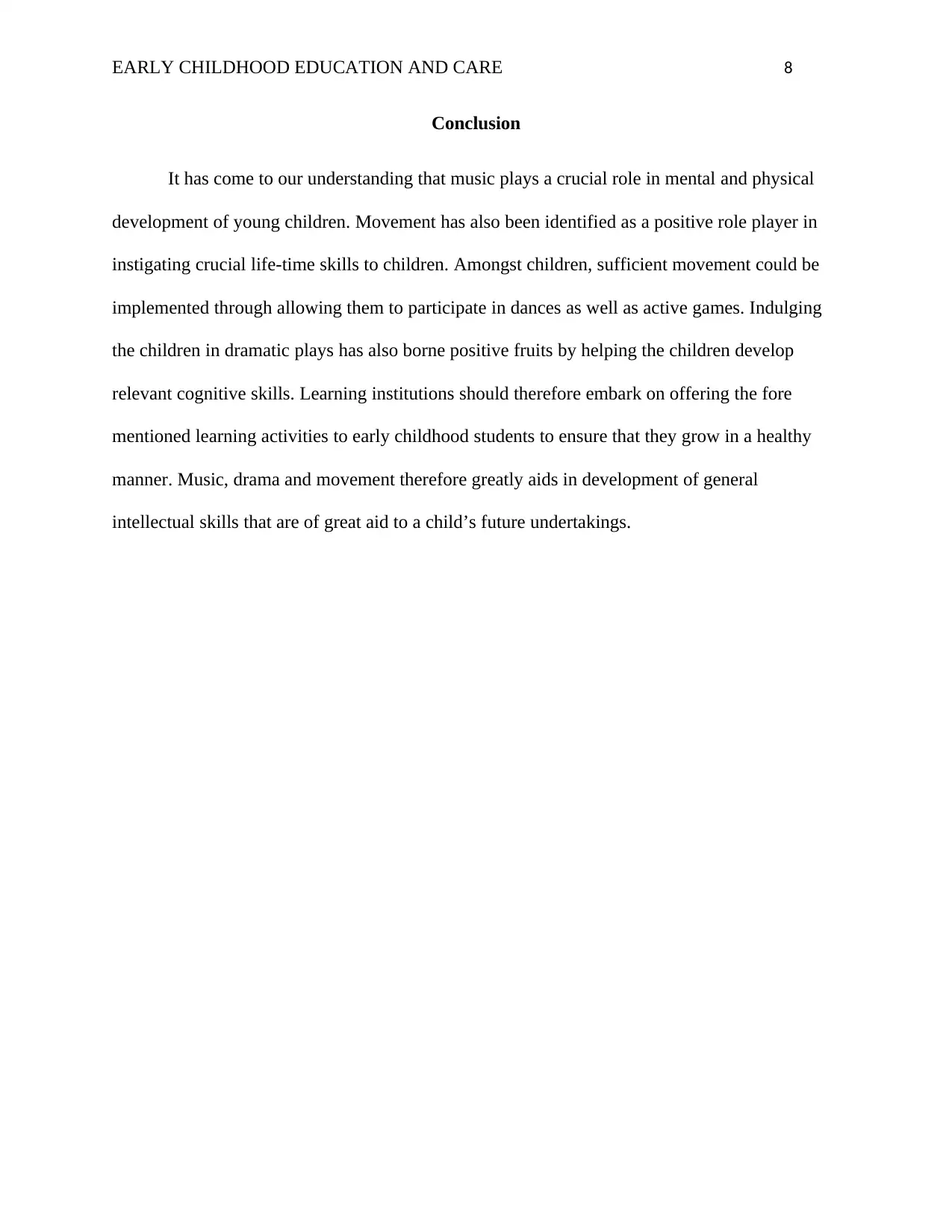
EARLY CHILDHOOD EDUCATION AND CARE 8
Conclusion
It has come to our understanding that music plays a crucial role in mental and physical
development of young children. Movement has also been identified as a positive role player in
instigating crucial life-time skills to children. Amongst children, sufficient movement could be
implemented through allowing them to participate in dances as well as active games. Indulging
the children in dramatic plays has also borne positive fruits by helping the children develop
relevant cognitive skills. Learning institutions should therefore embark on offering the fore
mentioned learning activities to early childhood students to ensure that they grow in a healthy
manner. Music, drama and movement therefore greatly aids in development of general
intellectual skills that are of great aid to a child’s future undertakings.
Conclusion
It has come to our understanding that music plays a crucial role in mental and physical
development of young children. Movement has also been identified as a positive role player in
instigating crucial life-time skills to children. Amongst children, sufficient movement could be
implemented through allowing them to participate in dances as well as active games. Indulging
the children in dramatic plays has also borne positive fruits by helping the children develop
relevant cognitive skills. Learning institutions should therefore embark on offering the fore
mentioned learning activities to early childhood students to ensure that they grow in a healthy
manner. Music, drama and movement therefore greatly aids in development of general
intellectual skills that are of great aid to a child’s future undertakings.
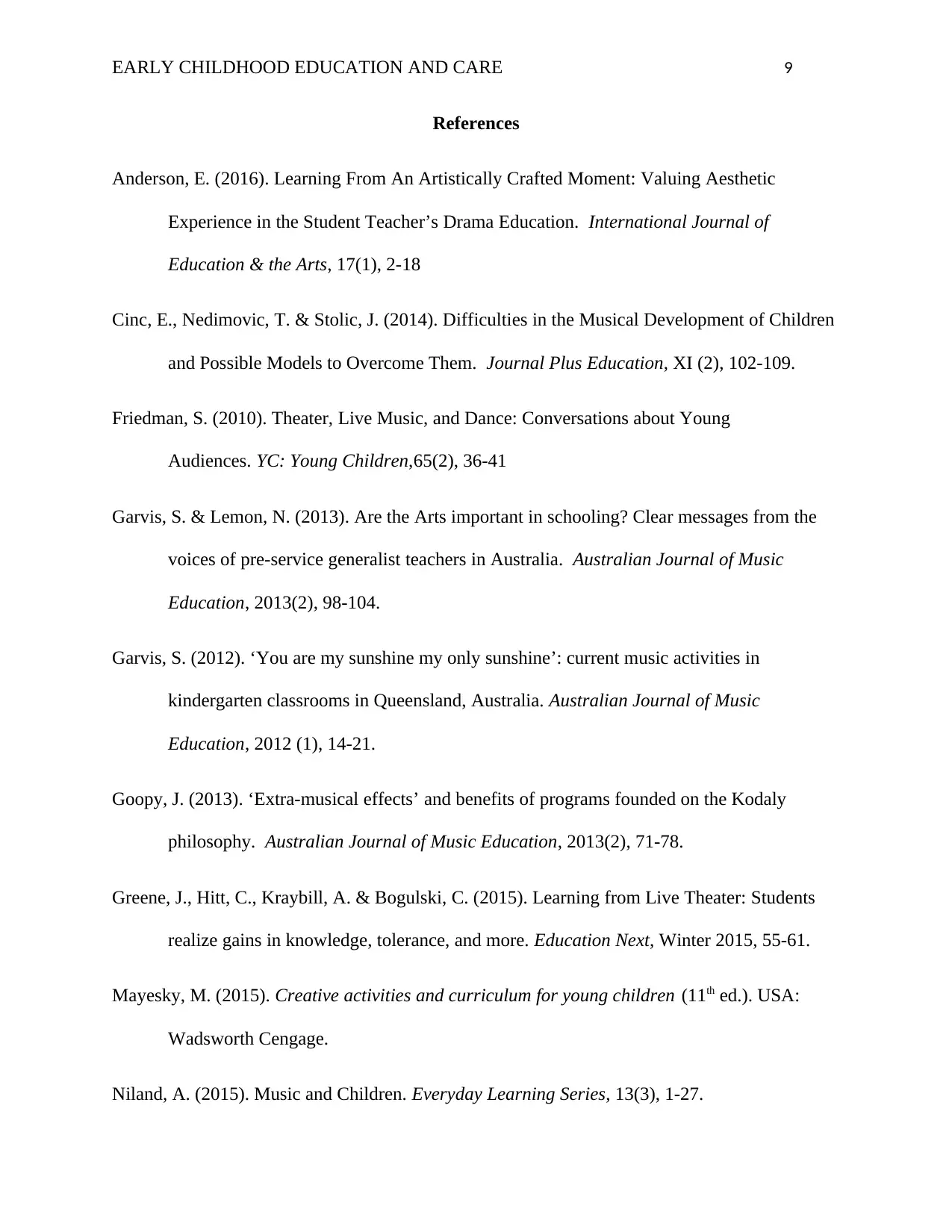
EARLY CHILDHOOD EDUCATION AND CARE 9
References
Anderson, E. (2016). Learning From An Artistically Crafted Moment: Valuing Aesthetic
Experience in the Student Teacher’s Drama Education. International Journal of
Education & the Arts, 17(1), 2-18
Cinc, E., Nedimovic, T. & Stolic, J. (2014). Difficulties in the Musical Development of Children
and Possible Models to Overcome Them. Journal Plus Education, XI (2), 102-109.
Friedman, S. (2010). Theater, Live Music, and Dance: Conversations about Young
Audiences. YC: Young Children,65(2), 36-41
Garvis, S. & Lemon, N. (2013). Are the Arts important in schooling? Clear messages from the
voices of pre-service generalist teachers in Australia. Australian Journal of Music
Education, 2013(2), 98-104.
Garvis, S. (2012). ‘You are my sunshine my only sunshine’: current music activities in
kindergarten classrooms in Queensland, Australia. Australian Journal of Music
Education, 2012 (1), 14-21.
Goopy, J. (2013). ‘Extra-musical effects’ and benefits of programs founded on the Kodaly
philosophy. Australian Journal of Music Education, 2013(2), 71-78.
Greene, J., Hitt, C., Kraybill, A. & Bogulski, C. (2015). Learning from Live Theater: Students
realize gains in knowledge, tolerance, and more. Education Next, Winter 2015, 55-61.
Mayesky, M. (2015). Creative activities and curriculum for young children (11th ed.). USA:
Wadsworth Cengage.
Niland, A. (2015). Music and Children. Everyday Learning Series, 13(3), 1-27.
References
Anderson, E. (2016). Learning From An Artistically Crafted Moment: Valuing Aesthetic
Experience in the Student Teacher’s Drama Education. International Journal of
Education & the Arts, 17(1), 2-18
Cinc, E., Nedimovic, T. & Stolic, J. (2014). Difficulties in the Musical Development of Children
and Possible Models to Overcome Them. Journal Plus Education, XI (2), 102-109.
Friedman, S. (2010). Theater, Live Music, and Dance: Conversations about Young
Audiences. YC: Young Children,65(2), 36-41
Garvis, S. & Lemon, N. (2013). Are the Arts important in schooling? Clear messages from the
voices of pre-service generalist teachers in Australia. Australian Journal of Music
Education, 2013(2), 98-104.
Garvis, S. (2012). ‘You are my sunshine my only sunshine’: current music activities in
kindergarten classrooms in Queensland, Australia. Australian Journal of Music
Education, 2012 (1), 14-21.
Goopy, J. (2013). ‘Extra-musical effects’ and benefits of programs founded on the Kodaly
philosophy. Australian Journal of Music Education, 2013(2), 71-78.
Greene, J., Hitt, C., Kraybill, A. & Bogulski, C. (2015). Learning from Live Theater: Students
realize gains in knowledge, tolerance, and more. Education Next, Winter 2015, 55-61.
Mayesky, M. (2015). Creative activities and curriculum for young children (11th ed.). USA:
Wadsworth Cengage.
Niland, A. (2015). Music and Children. Everyday Learning Series, 13(3), 1-27.
⊘ This is a preview!⊘
Do you want full access?
Subscribe today to unlock all pages.

Trusted by 1+ million students worldwide
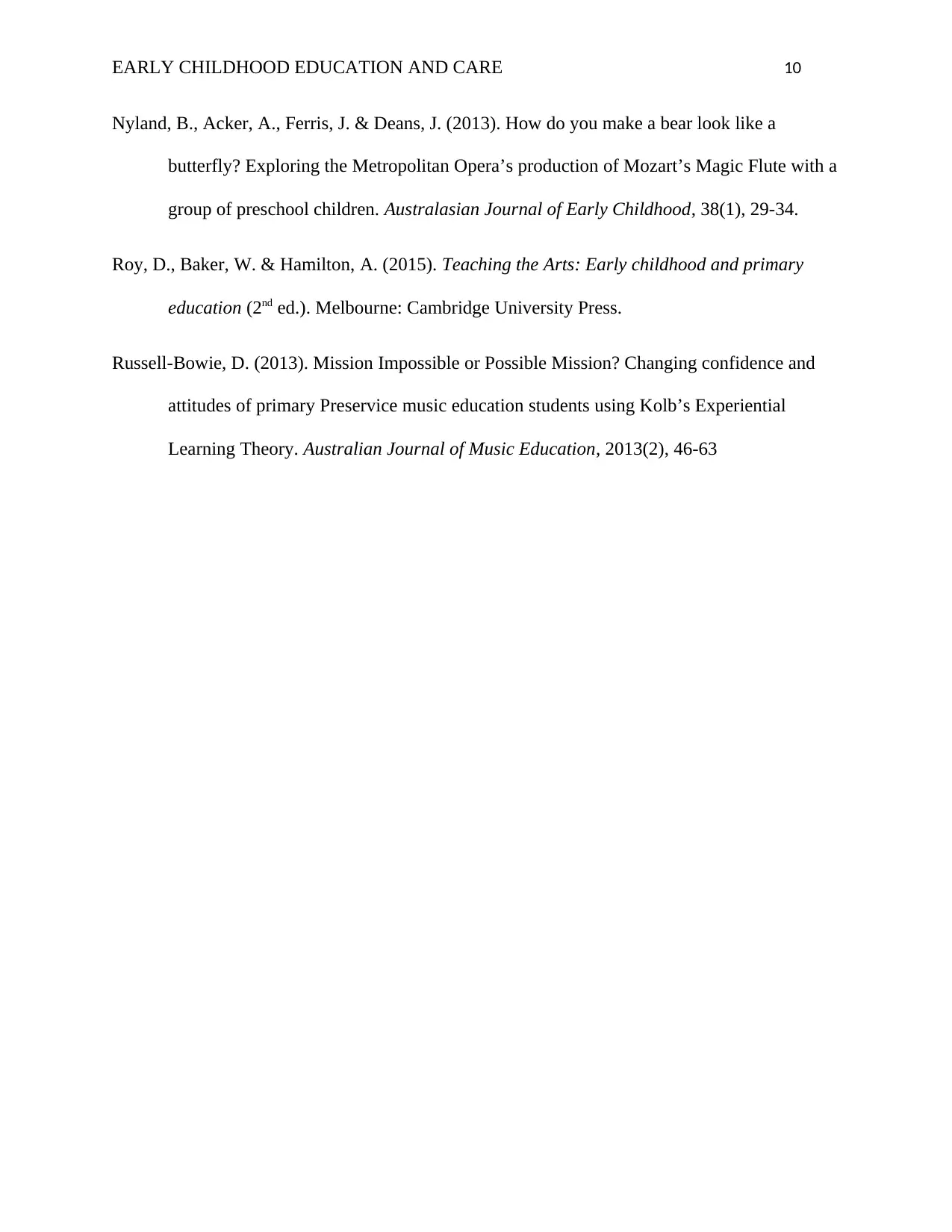
EARLY CHILDHOOD EDUCATION AND CARE 10
Nyland, B., Acker, A., Ferris, J. & Deans, J. (2013). How do you make a bear look like a
butterfly? Exploring the Metropolitan Opera’s production of Mozart’s Magic Flute with a
group of preschool children. Australasian Journal of Early Childhood, 38(1), 29-34.
Roy, D., Baker, W. & Hamilton, A. (2015). Teaching the Arts: Early childhood and primary
education (2nd ed.). Melbourne: Cambridge University Press.
Russell-Bowie, D. (2013). Mission Impossible or Possible Mission? Changing confidence and
attitudes of primary Preservice music education students using Kolb’s Experiential
Learning Theory. Australian Journal of Music Education, 2013(2), 46-63
Nyland, B., Acker, A., Ferris, J. & Deans, J. (2013). How do you make a bear look like a
butterfly? Exploring the Metropolitan Opera’s production of Mozart’s Magic Flute with a
group of preschool children. Australasian Journal of Early Childhood, 38(1), 29-34.
Roy, D., Baker, W. & Hamilton, A. (2015). Teaching the Arts: Early childhood and primary
education (2nd ed.). Melbourne: Cambridge University Press.
Russell-Bowie, D. (2013). Mission Impossible or Possible Mission? Changing confidence and
attitudes of primary Preservice music education students using Kolb’s Experiential
Learning Theory. Australian Journal of Music Education, 2013(2), 46-63
1 out of 10
Related Documents
Your All-in-One AI-Powered Toolkit for Academic Success.
+13062052269
info@desklib.com
Available 24*7 on WhatsApp / Email
![[object Object]](/_next/static/media/star-bottom.7253800d.svg)
Unlock your academic potential
Copyright © 2020–2026 A2Z Services. All Rights Reserved. Developed and managed by ZUCOL.





